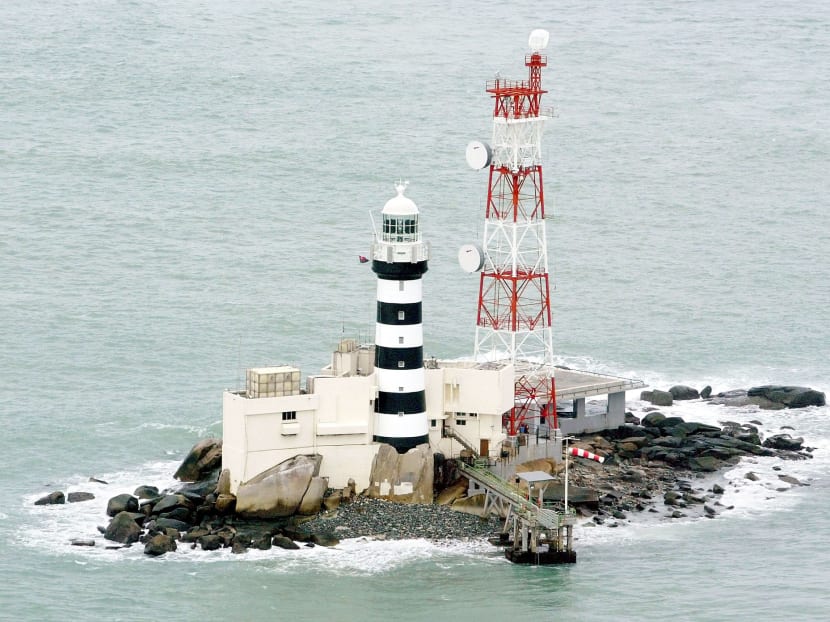Singapore confident of its case on Pedra Branca: Vivian
SINGAPORE –– Singapore strongly believes the documents filed by Malaysia to challenge the 2008 decision by the International Court of Justice (ICJ) that ruled Pedra Branca to be Singaporean territory does not satisfy a legal clause under the court’s statute.

The tiny island of Pedra Branca, where Singapore administers a lighthouse, sits at the entrance to the Singapore Strait about 30 km (19 miles) east of the city state and 15 km off peninsular Malaysia's southern coast on Jan 6, 2003. Photo: Reuters
SINGAPORE –– Singapore strongly believes the documents filed by Malaysia to challenge the 2008 decision by the International Court of Justice (ICJ) that ruled Pedra Branca to be Singaporean territory does not satisfy a legal clause under the court’s statute.
Speaking during the Committee of Supply Debate in Parliament on Thursday, Minister for Foreign Affairs Vivian Balakrishnan said the Republic’s legal team has studied Malaysia’s application carefully, including the three documents relied by Putrajaya to support its application.
“Our legal team strongly believes that the documents relied on by Malaysia do not satisfy the criteria under Article 61,” he said in response to questions by Members of Parliament Amrin Amin and Baey Yam Keng on the case.
“We will submit to the ICJ our comprehensive and compelling rebuttal to Malaysia’s application by 14 June, which is the time limit fixed by the ICJ. We are confident of our legal team and our case,” added Dr Balakrishnan.
Article 61 of the Statute of the Court provides that an application for revision of an ICJ judgment may be made only when it is “based upon the discovery of some fact of such a nature as to be a decisive factor, which fact was, when the judgment was given, unknown to the Court and also to the party claiming revision, always provided that such ignorance was not due to negligence”.
The request for revision must be submitted within six months of the discovery of the new fact and not later than 10 years from the date of the judgment.
Malaysian Attorney-General Mohamed Apandi Ali had filed an application with the ICJ at The Hague in February over the sovereignty of Pedra Branca, which is located some 24 nautical miles to the east of Singapore.
Malaysia cited “new facts” discovered in recently declassified British documents which it said would have had resulted in a “different conclusion” by the court.
The “new facts” originate from three documents recently discovered in the United Kingdom’s national archive — internal correspondence of the Singapore colonial authorities in 1958, an incident report filed in 1958 by a British naval officer and an annotated map of naval operations from the 1960s.
When contacted by TODAY, Mr Apandi said he would not comment until he saw Singapore's submission at the ICJ.
Singapore has formed a legal team to respond to Malaysia’s challenge. The team includes Attorney-General Lucien Wong, former Deputy Prime Minister S Jayakumar, Professor Tommy Koh and former Chief Justice Chan Sek Keong.
Dr Balakrishnan said on Thursday that Singapore is “very fortunate” to still have Prof Jayakumar, Mr Chan and Mr Koh, who led the original Pedra Branca team. He added that Singapore is committed to resolving the issue amicably and in accordance with international law.
“Bilateral relations with Malaysia are good, and mutually-beneficial bilateral cooperation will continue,” he said. “Singaporeans should not be disconcerted by these developments. Even with the best of diplomatic and personal relationships, we must expect other states to act in their own self-interests.”
Separately, the Ministry of Foreign Affairs announced on Thursday that Singapore has picked Judge Gilbert Guillaume to sit as judge ad hoc for the case involving the Malaysian challenge at the ICJ.
"Under the Statute of the ICJ, if there is no judge of the nationality of the parties on the Bench of the Court, the parties may each choose a judge ad hoc who will take part in the decision on the case," the ministry said in a statement.
Judge Guillaume, a French national, was a Member of the ICJ from 1987 to 2005, and served as its President from 2000 to 2003. He is currently a Member of the Permanent Court of Arbitration at The Hague in the Netherlands.






